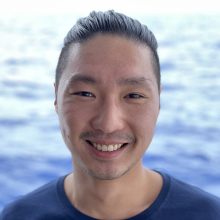
Kotachi Liu
Tell us about your work/research. What kinds of things do you do?
I work on autonomous underwater vehicle (AUV) navigation -autopilot for underwater drones. My goal is to coordinate a group of AUVs to work cooperatively towards a common goal. Since the ocean is really big, having robots work in teams is necessary to cover large areas quickly. For example, only 20% of the seafloor has been mapped at high resolution. A fleet of AUVs working cooperatively has the potential to increase that number dramatically.
I am currently adding navigation capabilities to an open-source underwater vehicle simulator, a general-purpose simulator that works for any vehicle. By fusing various sensor inputs such as pressure and acceleration, the simulated vehicle generates an estimate of where it is, how fast it's going, and in what direction. Once communication protocols are added, I will use this environment to test various control strategies to see how they behave in groups.
What sparked your initial interest in your career?
I took an elective at the Scripps Institution of Oceanography (SIO) during undergrad and was hooked immediately. Having grown up in Beijing far from any coast, I didn't know careers at sea outside of fishing existed. The course was biomechanics - we learned about the incredible movement and structure of organisms that seemed to defy our understanding of physics. I gained an appreciation for the ocean as Earth's last frontier and realized it likely contains answers to many of our problems, from engineering challenges to the origin of life.
Who influenced you or encouraged you the most?
My middle school science teacher took notice of my interest in innovation and encouraged me to find "blue oceans", unexplored domains untainted by competition. Mr. Minton, if you're reading this I took your advice literally. I try to learn from people in my life, people I read about and some fictional characters. I grew up watching a lot of anime and learned from characters like Rock Lee and Zuko to never give up and follow my own path. Tony Stark was my first example of someone who changed the world for the better through innovation. At school, my advisor Chris Roman has a no-frills approach to science that combines understanding the essence of a problem and explaining concepts simply and free of jargon. I try to emulate this in my work. I also draw inspiration from a pool of exceptional individuals I haven't met (yet). These include David Goggins (Ultra-endurance athlete/Former Navy SEAL), Lex Fridman (AI researcher/Host of the Lex Fridman podcast), Elon Musk (Entrepreneur/Engineer), Tim Urban (Runs waitbutwhy.com), John Danaher (Martial-arts instructor) and Jocko Willink (Former Navy SEAL/Author).
What element of your work/study do you think is the most fascinating?
Without question sailing and working with ROVs. Joining the Corps of Exploration has allowed me to fulfill a childhood dream I didn't think I ever could. While I hope my research can improve the effectiveness of our unmanned vehicles, there is something irreplaceable about in-person exploration.
What other jobs led you to your current career?
My first job as an undergrad was to train people to use electron microscopes. Since we encouraged people to bring their own samples, I got to see a lot of different types of work. Of all the samples we imaged, biological materials were by far the most intricate and multifunctional. I started working as a research assistant in biological materials labs studying avian feather mechanics and designing flexible bioinspired armor. Dr. Jessica Sandoval was a PhD student in the same department and introduced me to ocean exploration and I've been trying to get involved since. I pursued a master's at SIO in marine biology, where I learned there was a lot of room for improvement in our ability to access the ocean. At the time I didn't know how to fit myself in that picture, so I reached out to people with some experience. I was lucky to get in touch with Captain Don Walsh (1st expedition to Challenger Deep), who encouraged me to apply to graduate programs in ocean engineering.
What are your degrees and certifications?
Bachelor of Science in Chemical Engineering - University of California, San Diego 2018
Bachelor of Science in Physiology and Neuroscience - University of California, San Diego 2018
Masters of Science in Marine Biology - Scripps Institution of Oceanography, 2019
Doctorate of Philosophy in Ocean Engineering - the University of Rhode Island, in progress
What are your hobbies?
I spend most of my time outside school training jiujitsu, kickboxing, and muay thai at a martial arts academy. When the waves are nice in Narragansett I'll go surf, although my ability does not reflect the time I spent in San Diego. I bike during the warmer months and hope to do a triathlon once I conquer my fear of running. I eat a lot so I end up cooking a lot too.
What advice would you give someone who wants to have a career like yours?
The intersection between "what you're interested in" and "how you can be useful" is a great north star. This also accommodates any changes in interests, so be open to that if it happens! The hard part is figuring out what you're going to do. Once you've figured that out, start building strong foundational skills for your field and learn the lay of the land; find out where most people are focusing most of their time and where they overlook. Improvements in neglected areas have the potential to significantly progress the discipline.
How did you get involved with the Ocean Exploration Trust?
My advisor Chris has led many expeditions for OET and helped me get involved.
Expeditions
Kotachi participated in the following Ocean Exploration Trust expeditions:
